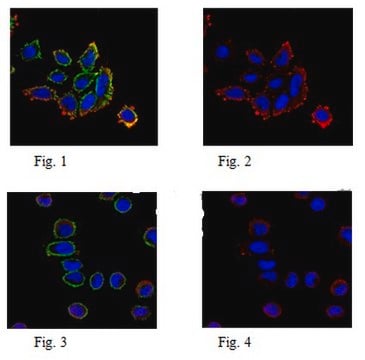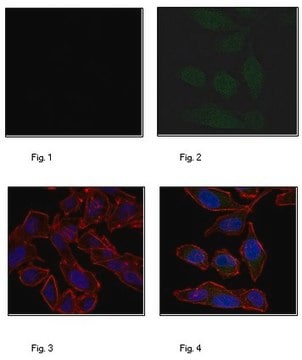MABE343-AF488
Anti-Puromycin, clone 12D10, Alexa Fluor™ 488 Conjugate Antibody
clone 12D10, 0.5 mg/mL, from mouse
Synonym(s):
Alexa Fluor 488 antibody
Sign Into View Organizational & Contract Pricing
All Photos(3)
About This Item
UNSPSC Code:
12352203
eCl@ss:
32160702
NACRES:
NA.41
Recommended Products
biological source
mouse
Quality Level
conjugate
ALEXA FLUOR™ 488
antibody form
purified antibody
antibody product type
primary antibodies
clone
12D10, monoclonal
species reactivity
human
concentration
0.5 mg/mL
technique(s)
immunocytochemistry: suitable
shipped in
wet ice
target post-translational modification
unmodified
General description
Puromycin is an aminonucleoside antibiotic, derived from the Streptomyces alboniger bacterium, that functions as a protein synthesis inhibitor that blocks translation through premature chain termination in the ribosome. Monoclonal antibodies to puromycin may be used with standard immunochemical methods to directly monitor translation, a method known as surface sensing of translation (SUnSET). Part of the molecule resembles the 3′ end of the aminoacylated tRNA, making it useful for protein translation analysis. Puromycin induces DNA fragmentation in thymocytes and in human HL-60 leukemia cells.
This product is a conjugated version of Cat. No. MABE343.
This product is a conjugated version of Cat. No. MABE343.
Specificity
Demonstrated to react with Human test sample, preincubated with Puromycin. Predicted to react with all species when test sample is incubated with Puromycin.
This antibody detects Puromycin-incorporated neosynthesized proteins.
Immunogen
Puromycin-incorporated neosynthesized proteins at multiple molecular weights
Application
Research Category
Epigenetics & Nuclear Function
Epigenetics & Nuclear Function
Research Sub Category
Cell Cycle, DNA Replication & Repair
Cell Cycle, DNA Replication & Repair
This Anti-Puromycin, clone 12D10 is validated for use in Immunocytochemistry for the detection of Puromycin.
Quality
Evaluated by Immunocytochemistry in untreated and Puromycin treated HeLa cells.
Immunocytochemistry Analysis: A 1:2,500 dilution of this antibody detected Puromycin-incorporated neosynthesized proteins in HeLa cells treated with Puromycin only.
Alexa Fluor™ is a registered trademark of Life Technologies.
Immunocytochemistry Analysis: A 1:2,500 dilution of this antibody detected Puromycin-incorporated neosynthesized proteins in HeLa cells treated with Puromycin only.
Alexa Fluor™ is a registered trademark of Life Technologies.
Target description
Refer to Cat. No. MABE343 for observed molecular weight information.
Physical form
Protein G Purified
Purified rat monoclonal conjugate in buffer containing PBS and 15 mg/ml BSA with 0.1% Sodium Azide.
Storage and Stability
Stable for 1 year at 2-8°C from date of receipt.
Legal Information
ALEXA FLUOR is a trademark of Life Technologies
Disclaimer
Unless otherwise stated in our catalog or other company documentation accompanying the product(s), our products are intended for research use only and are not to be used for any other purpose, which includes but is not limited to, unauthorized commercial uses, in vitro diagnostic uses, ex vivo or in vivo therapeutic uses or any type of consumption or application to humans or animals.
Not finding the right product?
Try our Product Selector Tool.
Storage Class Code
12 - Non Combustible Liquids
WGK
WGK 2
Flash Point(F)
Not applicable
Flash Point(C)
Not applicable
Certificates of Analysis (COA)
Search for Certificates of Analysis (COA) by entering the products Lot/Batch Number. Lot and Batch Numbers can be found on a product’s label following the words ‘Lot’ or ‘Batch’.
Already Own This Product?
Find documentation for the products that you have recently purchased in the Document Library.
Benjamin J Jenkins et al.
Cell metabolism, 35(7), 1132-1146 (2023-05-26)
Augmented T cell function leading to host damage in autoimmunity is supported by metabolic dysregulation, making targeting immunometabolism an attractive therapeutic avenue. Canagliflozin, a type 2 diabetes drug, is a sodium glucose co-transporter 2 (SGLT2) inhibitor with known off-target effects on
Qi Wu et al.
Oxidative medicine and cellular longevity, 2019, 7064319-7064319 (2019-06-19)
Ribosome biogenesis is a crucial biological process related to cell proliferation, redox balance, and muscle contractility. Aortic smooth muscle cells (ASMCs) show inhibition of proliferation and apoptosis, along with high levels of oxidative stress in aortic dissection (AD). Theoretically, ribosome
Honyin Chiu et al.
iScience, 24(7), 102748-102748 (2021-07-20)
The cap-binding protein eukaryotic initiation factor 4E (eIF4E) promotes translation of mRNAs associated with proliferation and survival and is an attractive target for cancer therapeutics. Here, we used Eif4e germline and conditional knockout models to assess the impact of reduced
Chao-An Cheng et al.
Journal of virology, 95(17), e0236420-e0236420 (2021-06-17)
Nervous necrosis virus (NNV) belongs to the Betanodavirus genus of the Nodaviridae family and is the main cause of viral nervous necrosis disease in marine fish larvae and juveniles worldwide. The NNV virion contains two positive-sense, single-stranded RNA genomes, which
Sara Ricciardi et al.
Cell metabolism, 28(6), 895-906 (2018-09-11)
Naive T cells respond to T cell receptor (TCR) activation by leaving quiescence, remodeling metabolism, initiating expansion, and differentiating toward effector T cells. The molecular mechanisms coordinating the naive to effector transition are central to the functioning of the immune system, but remain
Our team of scientists has experience in all areas of research including Life Science, Material Science, Chemical Synthesis, Chromatography, Analytical and many others.
Contact Technical Service






